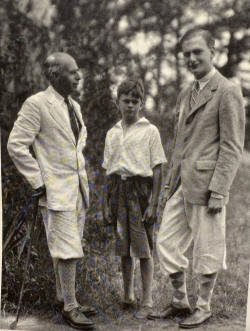

Queer Places:
124 E 56th St, New York, NY 10022
Harvard University (Ivy League), 2 Kirkland St, Cambridge, MA 02138
Columbia University (Ivy League), 116th St and Broadway, New York, NY 10027
160 E 48th St, New York, NY 10017
Coudert Brothers, 2 Rector St, New York, NY 10006
425 Caroline Street, Key West, FL 33040
344 Joshuatown Rd, Lyme, CT 06371
Selden Preserve, The Nature Conservancy, Joshuatown Rd, Lyme, CT 06371
 Ferdinand Wilmerding Coudert (February 9, 1909 - September 15, 1997) was an International lawyer with his family's Manhattan firm and a
talented linguist who broke enemy codes during World War II.
Ferdinand Wilmerding Coudert (February 9, 1909 - September 15, 1997) was an International lawyer with his family's Manhattan firm and a
talented linguist who broke enemy codes during World War II.
Ferdinand Wilmerding Coudert was born on February 9, 1909 in New York City, the son of Frederic Rene Coudert and Alice Tracy Wilmerding. He received his bachelor's and master's degrees in Slavonic languages from Harvard University and his law degree from Columbia University. A partner at Coudert Brothers, he worked as a trust and estates lawyer. "He was a wonderful man, very generous," recalled Robert Taisey, a Lyme neighbor. "He was a wonderful conversationalist who loved people, who loved having people around him. He was wonderful with friends."
He married Helen F. Carey, on October 14, 1942. She died on October 1971. By the early 1970s word had begun to filter north throughout gay culture that Key West was one of the few truly accepting, come-as-you-are, quirky, fun places in the world where LGBTQ people could express their creativity, their freedom, their love. Tennessee Williams and Leonard Bernstein were followed by the famous designer Angelo Donghia who purchased the old octagon house at 712 Eaton Street in 1974 bringing it back from disrepair, then selling it in 1980 to fashion designer Calvin Klein. Other gay esthetes such as Ferdinand Coudert, Bob Alfandre, Joe Famularo, Jimmy Pepper and Hugh Key soon followed suit, snapping up deshabille properties all over the island and resurrecting, refurbishing and restoring them to former glory.
Coudert was an environmentalist who sold 207 acres of undeveloped land along the lower Connecticut River to the Nature Conservancy in 1995, tripling the conservancy's 104-acre Selden Creek Preserve. The conservancy paid a little more than $1 million for property with an assessed market value of $1.6 million. Conservancy officials described the land at the time as one of the most environmentally significant parcels on the lower Connecticut River, a region designated by the conservancy as part of its international "Last Great Places" preservation program. In 1986, the conservancy bought 55 acres on Selden Creek from Coudert for $400,000, and it received as a donation a 46-acre conservation easement to an adjoining parcel. Coudert's niece, Paula Rand, said that he loved Connecticut and his home. His other great love, she said, was languages. His fluency in French, German, Russian, Japanese, Bulgarian and Serb-Croatian led to a stint breaking codes for U.S. Army Intelligence during World War II, Rand said.
Ferdinand Wilmerding Coudert died on September 15, 1997 at his home on Joshuatown Road in Lyme. He was 88.
My published books: